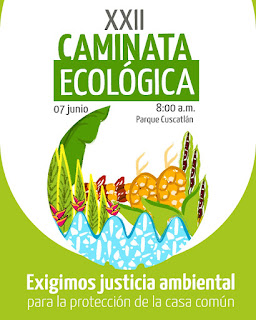El Salvador's environmental movement
Earlier this week, El Salvador's environmental groups came together for the 22nd annual Caminata Ecológica or "Environment March". They walked through the streets of the capital San Salvador under the theme Exigimos justicia ambiental para el cuido de nuestra casa común -- "We demand environmental justice for the care of our common home."
The march began at Cuscatlan Park in the center of San Salvador and proceeded towards the presidential palace, although barricades and riot police stopped the march short of the palace. March leaders were not greeted by anyone from the executive branch, but could only deliver their letter at the correspondence window.
¡Exigimos Justicia Ambiental para el cuidado de nuestra casa común! @SomosAguaES fue parte de la XXII Caminata Ecológica, en el marco del Día Mundial del Medio Ambiente, para exigir el respeto de los derechos ambientales, nuestros bienes naturales y territorios. pic.twitter.com/r1p9jmDwQb
— Alianza Nacional contra la Privatización del Agua (@SomosAguaES) June 7, 2022
There were dozens of groups represented, advocating for protection of the environment and natural resources of El Salvador in a variety of contexts. The organizers issued a statement on the day of the march and held a pre-march press conference to amplify certain themes.
Some of the issues which marchers highlighted on their signs and banners included:
- Preventing a return of metallic mining. The Anti-Mining Roundtable is warning that mineral mining, and not just Bitcoin mining, may be returning to El Salvador. They are fearful of the possibility that the current government may be interested in repealing the metallic mining ban adopted into law in 2017.
- Denouncing cross-border water contamination. Important El Salvador watersheds start in Guatemala and Honduras. The operations of the Cerro Blanco open pit gold mine in Guatemala can produce toxic pollution affecting all three countries.
- Blocking large real estate development projects in environmentally sensitive areas important for watersheds and preserving undeveloped forest land. Those projects include the mega-project Valle El Angel, which threatens the sustainability of a major underground aquifer critical for tens of thousands and "Ciudad Kalamanda" in Nuevo Cuscatlan in the Bálsamo foothills southwest of San Salvador, destroying forested hillsides important to the communities below.
- Calling for ratification of the Escazú Agreement, an international treay signed by Latin American and Caribbean countries which guarantees the right to access environmental information and participate in environmental decision-making, thereby promoting access to information and access to justice related to environmental matters.
- Protesting major water concessions as a form of privatizing water resources and putting them under control of private business interests. Such concessions are envisioned in the National Water Law recently passed by the Legislative Assembly and by a recent Supreme Judicial Court ruling which held that underground water was not a public good.
- Amending the constitution to include water as a human right.
- Calling for enforcement of regulations including banning various toxic agricultural chemicals used in sugar cane and other industrial agriculture.
- Emphasizing food sovereignty for El Salvador in which there would be more emphasis on growing the basic foodstuffs of the Salvadoran diet to reduce the need to import, and less emphasis on export crops like sugarcane.
- Blocking construction of an 8th dam on the Sensunapan River which threatens the cultural and environmental rights of the indigenous populations of the municipality of Nahuizalco.
You can follow environmental issues in El Salvador on Twitter using this list of environmental groups in El Salvador which compiles all their tweets.
Comunidades y sectores colectivos marchan hacia Casa Presidencial para presentar las demandas ambientales al presidente @nayibbukele. Entre las exigencias de la sociedad civil están: la defensa del agua, la no construcción de mega proyectos, entre otros.@GatoEncerradoSV. pic.twitter.com/3CweM1qGpD
— Marvin Diaz (@GuerreroMarvin) June 7, 2022

Comments